|
|
|
Sort Order |
|
|
|
Items / Page
|
|
|
|
|
|
|
| Srl | Item |
| 1 |
ID:
168177


|
|
|
|
|
| Summary/Abstract |
China is expected to become one of the largest markets for prescription drugs in the world and pharmaceutical advertising is becoming increasingly important, particularly in the socially and culturally contested area of mental health. This article briefly explores the background of drug advertising policies in China and the UK and focuses on the distinctive challenges of antidepressant drug regulation. Then, using tools of critical discourse analysis, it examines Chinese antidepressant adverts, and compares them with relevant British adverts. The findings indicate that, relative to the UK, Chinese antidepressant adverts are generally oversimplified, and the critical information concerning the concepts of caution, danger and adverse effects are underrepresented. However, there are many interdependent factors that contribute to the distinctive Chinese antidepressant drug regulatory regime. Hence, Chinese policymakers must maintain a delicate balance between learning from Western regulatory regimes, but also avoiding borrowing too heavily from them.
|
|
|
|
|
|
|
|
|
|
|
|
|
|
|
|
| 2 |
ID:
168176
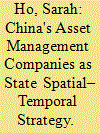

|
|
|
|
|
| Summary/Abstract |
Chinese authorities created four new asset management companies (AMCs) in 1999. These have since undergone profound transformations which have been influential in China's contemporary integration into the world market. Conventional interpretations see these powerful AMCs in largely technical and asocial terms. By contrast, we employ a critical geographical analytical framework to understand the transformation of these AMCs as an expression of the state's spatial–temporal strategy to create conditions of political economic stability now by displacing the conditions of financial instability and crisis into the future. This strategy does not come without unintended and destabilizing consequences, nor is it without class-based social and political implications.
|
|
|
|
|
|
|
|
|
|
|
|
|
|
|
|
| 3 |
ID:
168171
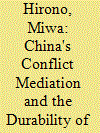

|
|
|
|
|
| Summary/Abstract |
China's efforts in conflict mediation are an important test of the durability of the principle of non-interference. By analysing the approaches and means of China's post-2014 mediation efforts in Afghanistan, this article finds that China's behaviour shows it engages in medium-level interference in domestic affairs, but mostly with the host government's concurrence. This is because of the two forms China's mediation takes. In a bilateral context, China's mediation takes the form of “incentivizing mediation,” in which its economic power, and its omnidirectional foreign policy, provide incentives or leverage for warring factions to come to the negotiation table, but which also lets the warring factions formulate their own roadmap to peace talks. In a multilateral context, China sometimes engages in “formulative mediation,” in which the mediators, not the disputing parties, formulate a roadmap to peace talks.
|
|
|
|
|
|
|
|
|
|
|
|
|
|
|
|
| 4 |
ID:
168169
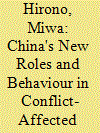

|
|
|
|
|
| Summary/Abstract |
China's view on the sanctity of state sovereignty has slowly but inexorably been transformed, and the country has found it difficult to continue to adhere to the principles of non-interference and non-intervention with the same degree of rigour as during the Cold War era. This special section will explore what the principles mean to China today; why and how Beijing has become active in peacebuilding and conflict mediation; and what implication China's approach to the principles has for its position in the global liberal order. This article sets the scene by firstly demonstrating that defining the principles has always been a political act, and secondly offering new discussions about how China's expanding economic power forced the country to more actively engage in politics of conflict-affected regions. Finally, it offers a conceptual framework to explain why and how China has become increasingly active in peacebuilding and conflict mediation.
|
|
|
|
|
|
|
|
|
|
|
|
|
|
|
|
| 5 |
ID:
168172
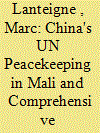

|
|
|
|
|
| Summary/Abstract |
China's increasing participation in United Nations peacekeeping operations reached a milestone in 2013 when Beijing agreed to send a large detachment of personnel, including combat forces for the first time, to support UN peacekeeping operations in Mali after that country fell into civil war. This commitment was also distinct in that unlike other African countries where Beijing has supplied peacekeepers, Mali is not a major trading partner with China. However, this mission has both cemented Beijing's greater commitment to building African partnerships as well as demonstrating its determination to move beyond “resource diplomacy” and towards a more comprehensive approach to engaging the continent. Although China has warmed to the principles of humanitarian intervention in civil conflicts, Mali has been a critical test of China's ability to participate in UN operations in a country which is still facing ongoing violence. The Mali mission is an important step in Beijing's turn towards greater realpolitik in Chinese Beijing's peacekeeping policies in keeping with its great power status. At the same time, participation in the Mali mission has been beneficial for China, not only in helping to build the country's peacekeeping credentials in Africa but also in underscoring China's increasingly distinct views on addressing intervention in civil conflicts.
|
|
|
|
|
|
|
|
|
|
|
|
|
|
|
|
| 6 |
ID:
168174
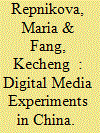

|
|
|
|
|
| Summary/Abstract |
With the rapid decline of traditional media in China, the party-state faces the growing challenge of shaping public opinion online. This article engages with one response to this challenge – a state-sanctioned digital media experiment aimed at creating a new form of journalism that appeals to the public and helps to disseminate Party propaganda. We analyse the emergence of a national success story, Shanghai-based model media outlet Pengpai, and its diffusion across different regions. We argue that the synergy between local officials and media entrepreneurs has propelled Pengpai’s national fame. We further demonstrate that while there has been a cross-national attempt to diffuse this model, it has produced mixed results owing to a number of factors, including the superficial commitment of local officials and media professionals. These findings demonstrate that state-sanctioned decentralized experimentation can deliver unpredictable results in the sphere of media policy, and they further question the capacity of the party-state to effectively reinvent public persuasion in the digital age.
|
|
|
|
|
|
|
|
|
|
|
|
|
|
|
|
| 7 |
ID:
168179


|
|
|
|
|
| Summary/Abstract |
On a random Tuesday in May 2019, I found myself in Shanghai's Pudong International Airport, waiting in a fortunately short and quickly moving immigration line prior to a return flight home. Just to the right was an immigration desk with what appeared to be a new sign: a “Belt-and-Road” channel (Yidai yilu tongdao). There was no one behind the BRI desk. I was intrigued by this, but of course did not dare to take a photograph of the sign in a restricted zone. Twenty minutes later I attempted to log on from the airline lounge, and ended with failure. The relevant two-step process now involved a passport scan, the receipt of a registration number that required inputting an (overseas) mobile number and receiving SMS verification with further password. The juxtaposition of the fast-track but empty BRI immigration desk and the clunky double verification procedure to get online at all seemed to encapsulate much China's current position in the world.
|
|
|
|
|
|
|
|
|
|
|
|
|
|
|
|
| 8 |
ID:
168178
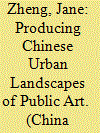

|
|
|
|
|
| Summary/Abstract |
This article uses an “urban landscapes” perspective to examine the urban sculpture scene and its production system in Shanghai. It reviews both the national urban sculpture discourse and urban sculpture planning practices since 1949, and then focuses on Shanghai specifically. It examines three major stakeholders in urban sculpture development and their interactions. The main argument is that Shanghai's urban sculpture scene has evolved due to the proliferation of aesthetic and symbolic sculptures as opposed to traditional monuments; however, urban entrepreneurialism and globalization have been shaped by the continuity of the Chinese ideological framework, which has transformed urban sculptures from explicit into veiled political didacticism under the guise of caring for the people.
|
|
|
|
|
|
|
|
|
|
|
|
|
|
|
|
| 9 |
ID:
168170
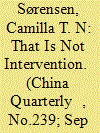

|
|
|
|
|
| Summary/Abstract |
There is among Chinese international relations scholars an intense debate about how China can protect and promote Chinese global presence and interests while at the same time continue to adhere to the principle of non-intervention. New concepts, distinctions and approaches are developing as the debate progresses. The current Chinese foreign and security policy practice reflects a more flexible and pragmatic Chinese interpretation – and implementation – of the principle of non-intervention with different degrees and types of intervention. This article explores the search for “legitimate great power intervention” characterizing both the debate among Chinese international relations scholars and the current Chinese foreign and security policy practice, and uses this case as the departure point for a more general discussion of the drivers of change – and continuity – in Chinese foreign and security policy.
|
|
|
|
|
|
|
|
|
|
|
|
|
|
|
|
| 10 |
ID:
168173


|
|
|
|
|
| Summary/Abstract |
This article demonstrates the growing adaptability of Chinese foreign policy to Gulf states’ expectations around issues that implicate them directly or are relevant (such as relations with the US, and the wars in Yemen and Syria). Gulf states reacted positively because China's approach incrementally integrated local demands in its strategizing, especially by finding common ground with Gulf states despite their own differences; China has done so while not being tied to a “hegemonic idea” (i.e. it is not trying to control or define Gulf politics). China's incrementalist and non-hegemonic regional approach significantly increased Gulf states’ acceptance of its interventions, adapted to Gulf states’ expectations, and, crucially, has been altering what these states expect of major powers in general. The article concludes by proposing that unfolding Gulf politics in light of the June 2017 GCC crisis is very likely to present China with multiple opportunities to demonstrate the adroitness of its strategic choices vis-à-vis the region.
|
|
|
|
|
|
|
|
|
|
|
|
|
|
|
|
|
|
|
|
|